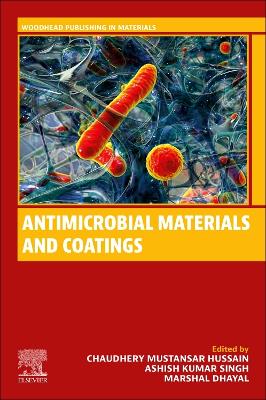Antiviral and Antimicrobial Smart Coatings
 -10%
portes grátis
-10%
portes grátis
Antiviral and Antimicrobial Smart Coatings
Fundamentals and Applications
Kumar, Aditya; Bilal, Muhammad; Gupta, Ram K.; Nguyen, Tuan Anh; Behera, Ajit
Elsevier - Health Sciences Division
01/2023
638
Mole
Inglês
9780323992916
15 a 20 dias
450
1. Introduction to the microbial world and associated diseases
2. Fungal and Viral pathogens, classification, and associated diseases
3. Various materials surfaces and growth of microbes and viruses on it
4. Identification and culture tests
5. Microbe- and virus-philic surfaces
6. Microbe- and virus-phobic surface coating
7. Industrial environment and microbes/virus growth
Section B: Smart Coatings
8. Introduction to smart coatings
9. Working principles of various smart coating on microbes/virus growth
10. Effect of shape responsive coating on microbes/virus growth
11. Electric responsive coating and microbes/virus growth
12. Magnetic responsive coating and microbes/virus growth
13. Synthesis techniques of smart coatings
14. Smart coatings and biomimetics
15. Biomaterials and biomimetics
Section C: Antibacterial, antifungal and Antiviral smart coatings
16. Polymeric antibacterial, antifungal and antiviral coatings
17. Nanotechnology in antibacterial, antifungal and antiviral coatings
18. Nanomaterials based smart coatings for antibacterial, antifungal and antiviral activities
19. Green antibacterial, antifungal and antiviral coatings
20. Effect of smart coating and durability
21. Hybrid antibacterial, antifungal and antiviral smart coatings
Section D: Methods/standards for characterization of smart coatings
22. Characterization methodologies for smart coating
23. Screening methods to determine antibacterial activity
24. Molecular Network Approach
25. Gas chromatography coupled to mass spectrometry
26. Physical and mechanical property measurement of antiviral/ antibacterial smart coating
27. Erosion property evaluation of antiviral/ antibacterial smart coating
28. Chromic property measurement of antiviral/ antibacterial smart coating
29. Current standards and their limitations/concerns for testing the antibacterial activity of smart coatings
Section E: Current and predictable scenario
30. Prediction and optimization of materials surface with respect to bacteria, fungus and virus growth
31. Role of Smart coating to eliminate COVID infection
32. Edible and food safe antiviral and antimicrobial smart coatings
33. Industrialization of antiviral and antimicrobial smart coatings
34. Antibacterial activity of plant extracts smart coating
35. Human safety and environmental concerns of antiviral and antimicrobial smart coatings
36. Laws and developments to implement antimicrobial coatings
1. Introduction to the microbial world and associated diseases
2. Fungal and Viral pathogens, classification, and associated diseases
3. Various materials surfaces and growth of microbes and viruses on it
4. Identification and culture tests
5. Microbe- and virus-philic surfaces
6. Microbe- and virus-phobic surface coating
7. Industrial environment and microbes/virus growth
Section B: Smart Coatings
8. Introduction to smart coatings
9. Working principles of various smart coating on microbes/virus growth
10. Effect of shape responsive coating on microbes/virus growth
11. Electric responsive coating and microbes/virus growth
12. Magnetic responsive coating and microbes/virus growth
13. Synthesis techniques of smart coatings
14. Smart coatings and biomimetics
15. Biomaterials and biomimetics
Section C: Antibacterial, antifungal and Antiviral smart coatings
16. Polymeric antibacterial, antifungal and antiviral coatings
17. Nanotechnology in antibacterial, antifungal and antiviral coatings
18. Nanomaterials based smart coatings for antibacterial, antifungal and antiviral activities
19. Green antibacterial, antifungal and antiviral coatings
20. Effect of smart coating and durability
21. Hybrid antibacterial, antifungal and antiviral smart coatings
Section D: Methods/standards for characterization of smart coatings
22. Characterization methodologies for smart coating
23. Screening methods to determine antibacterial activity
24. Molecular Network Approach
25. Gas chromatography coupled to mass spectrometry
26. Physical and mechanical property measurement of antiviral/ antibacterial smart coating
27. Erosion property evaluation of antiviral/ antibacterial smart coating
28. Chromic property measurement of antiviral/ antibacterial smart coating
29. Current standards and their limitations/concerns for testing the antibacterial activity of smart coatings
Section E: Current and predictable scenario
30. Prediction and optimization of materials surface with respect to bacteria, fungus and virus growth
31. Role of Smart coating to eliminate COVID infection
32. Edible and food safe antiviral and antimicrobial smart coatings
33. Industrialization of antiviral and antimicrobial smart coatings
34. Antibacterial activity of plant extracts smart coating
35. Human safety and environmental concerns of antiviral and antimicrobial smart coatings
36. Laws and developments to implement antimicrobial coatings







